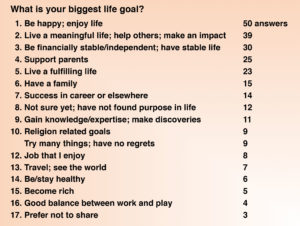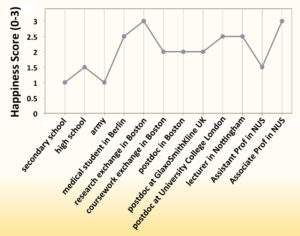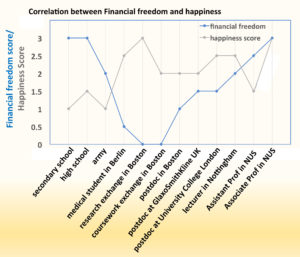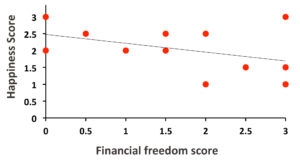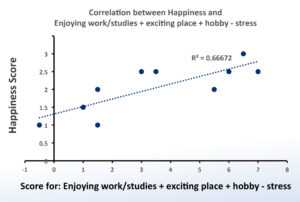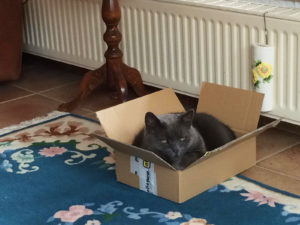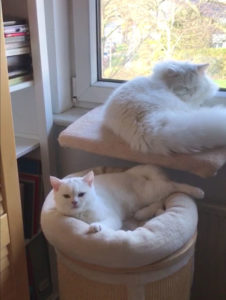What is your biggest goal in life?
If we want to succeed or progress in anything, one of the most important things is to reflect! Hence, in my Cell Biology module, I normally include a self reflection assignment. A few semester ago I included the question: What is your biggest goal in life?
I actually subsequently dropped this question, realising that what motivates us are not really the big goals, but the intermediate goals that we are currently working on. For instance, when I was a student, I had no concrete idea what I wanted to do with my life in the long run. Nonetheless, I was very motivated and passionate about various immediate goals (which all had not much to do with studying, e.g. triathlon, publishing a research paper, learning Japanese, travel).
But still, it was interesting to see what the students wanted to achieve as their biggest goal in life. And the #1 response was ‘Being happy and enjoy life’, which raises the question, what makes us happy?
What makes us happy is actually not such an easy question to answer, because our lives are complex, and hence it is not possible to assign simple cause-effect relationships. However, if we actually knew what makes us happy, we could actually take real steps to live a happier life!
I wanted to find out what makes ME happy, and to address this tricky issue, here is what I did. I looked back at the various periods of my life and assigned a ‘happiness score’, in other words, a score on how happy I felt during a specific period, based on my recollection (which of course could be a little deceiving).
I then scored potential factors and circumstances that could contribute to happiness and unhappiness, and determined whether any correlations can be found.
For instance, I scored how well of I was off in terms of my ‘financial freedom’. As a child, I was quite lucky that my parents were rather generous with us! In contrast, as a student, especially while on exchange, I practically had no money. And then after starting to work, my financial freedom increased very gradually.
Interestingly, as can be seen below, there appeared to be a negative correlation between how happy I felt and how well I was off financially. I am not sure if this has to do with the fact that when one has less, one tends to be more appreciative of things in general. But one thing that is clear, at least in my case, more money does not equate to more happiness.
I then did the same type of analysis for various other factors that could potentially contribute to happiness, including whether I enjoyed my job or my studies, my level of expertise or proficiency, my achievements, hobbies, family situation and relationship with friends, level of stress and pressure, whether I got to do meaningful and impactful things and whether I lived in a nice and culturally exciting place. I then tried to combine different factors to see which combination produces the highest correlation.
It turned out that my happiness best correlates with a combination of being excited and fulfilled with my work (or studies), having some fulfilling hobby(ies), living in an exciting place and having low levels of stress. Combining these four factors produced an impressive R-squared of 0.67, higher than any other combination.
So let’s think about these aspects (and some of the things that are not among the four critical factors) in more detail.
Being excited and fulfilled with our work or studies is clearly important to our happiness. According to Cal Newport, the four critical characteristics of a fulfilling occupation are Autonomy, Creativity, Mastery, Impact. Importantly, these things are not qualities that come automatically with some jobs, but they must be put into practice on a daily basis.
In a way, hobbies often entail the same qualities, or at least some of them. But of course, it depends on the type of hobby.
Watching drama series or playing mobile games as a hobby probably does not involve autonomy, creativity, mastery or impact. (Although playing games actually does involve mastery, it is not really the type of mastery that is very useful, or that one could be particularly proud of.) I personally feel that the best test of whether a hobby contributes to our happiness is asking ourselves the question, do I feel good about having just spend the last two hours doing [insert your activity here].
What often determines whether we feel good (or guilty) about our hobby is whether we have mastered something that we can be proud of, have created something new or have made an impact on others. It is also important whether we deliberately planned to pursue our hobby activity (autonomy) or whether we just did it as a way to avoid doing other tasks.
As mentioned, making an impact is an important factor in finding happiness. And indeed, if I imagine myself on an island alone where I could practice autonomy, creativity and mastery every day, it would seem meaningless if I cannot also make an impact on other people.
Hence, the fact that based on my happiness self-analysis it did not really matter to my happiness level whether I have helped other people or not (as there was no correlation between the two) was somewhat surprising to me. On the other hand, I think that it is very difficult to feel happy helping other people while doing things that one does not enjoy doing. Hence, I would think when trying to decide what to do with our life, we should really first consider how can we do something where we can develop as a person. And then there are almost always opportunities to turn this into something that benefits other people.
This also means that if we want to decide whether we should move on in some stage in our life, we should primarily decide based on whether we feel we can still develop in the current position, and not just based on whether we are helping people (unless our help is essential). There will always be ways in which we can help others, and the more we develop, the more we can help other people.
There was one time in my life during my exchange as a medical student in Boston where I was neither enjoying my clinical studies nor had hobbies (because there was no time for it). And I in fact felt very stressed about not really having much medical knowledge and experience and was always worried that I would be ‘exposed’ for my ignorance. Despite this, I remember this as a happy time. It goes to show that other factors can also be important when it comes to happiness. For me it was the fact that I was living in a really amazing city. Just being in Boston used to somehow magically make me feel happy.
The other reason for why this exchange was a happy time was probably that I got to spend time with my girlfriend. But what is it about girlfriends, boyfriends, or family that makes us happy?
I mentioned above that what makes work and studies exciting and fulfilling is if you can take the initiative to improve (develop) in order to ultimately make an impact (i.e. help other people). Can we apply the same to friends and family? I think yes. Based on my own experience, what makes me happy about having friends and family is if I can make them happy (impact). And making someone else happy requires a lot of mastery, to learn how to be comforting, understanding and supportive, because each of us are different. Coming up with things that make others happy also requires creativity on my part. And it is ultimately up to me to decide how I want to try to make them happy (autonomy).
I would say the same even applies to why people want to have pets. For me, the joy of having a pet comes from seeing the pet feel safe and happy due to the care we give to it. I don’t have a pet, though, but my sister and my parents have, and I guess they have them for this reason.
So therefore, if we seek happiness from our work, our hobbies, our friends and family, or even our pets, in the end it is all not that different. We need to find things (or people) that we are excited about or care about and then put in effort to become good at what we set out to do. The ultimate goal is to see ourselves grow and to see other people become happy and successful as a result of our action. And that for me is the meaning of life.
